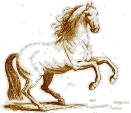ÉCOLE D’ÉQUITATION
School of Riding, Education for Horses

Education for horses
Christine Honoré Wehling offers training for horses and ponies at any level starting at 3 years old. French precepts are followed: calm, forward and straight, giving polite, respectful, happy horses. Most training is best done on a daily basis for at least a few months, but a little “tune up” could sometimes be done over one month only. It is also possible to have Christine overview the progression of your horse, working with it twice/week only, giving you the possibility to do some of the work and ride in lessons.
Training horses of all ages, breeds and at any level always has its set of challenges and rewards. Each horse wants to be taken through some of the progression with a different approach, and challenges its trainer to create new exercises, or try some out of the extensive old master’s literature available. A great asset to any trainer is having the flexibility to adapt to the horse, rather than trying to adapt the horse to a training regimen. So one cannot use one single method to train horses, especially when dealing with as many different breeds as there are in this region.
Taking time for ground work is a pre-
Starting a young horse under saddle should take about 3 months, give or take one depending on temperament. You can look up the specifics about working with young horses one page down from this one.
A tune up could be done with daily work for however long we want depending on how far you’d like your horse to go, or we might decide on only two sessions per week if the goal is for you to keep riding and maybe take lessons at the same time. A complete makeover will definitely require daily work. The specifics can be found on the Tune Up page of this website.
A good reliable and safe pony can only happen with training; the same than the big guys. See why ponies are made to contribute to their naughty reputation and how to deal with it in the ponies page.
Some of the books found in Christine’s library
In France, a book that you might re-
Here is a short list of some other books. I try to add a few volumes to my library
every year, and might re-
Général L’Hotte: “Questions équestres”, “Un officier de cavalerie”,
François Baucher: “Methode d’équitation”,
Etienne Beudant: “Extérieur et haute école”, “Vallerine”,
James Fillis: “Journal de dressage”, “Breaking and Riding”.
Plus so many more: la Guerinière, Xenophon, Newcastle, de Saunier, d’Aure, Decarpentry, de Kerbrech, Franconi, de Bragance, Podhajsky. And some modern as well: Henriquet, Karl, de Kunffy, Loch, etc.